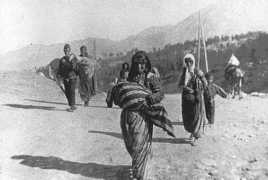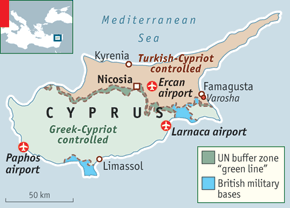The EU’s latest funding package for Northern Cyprus aims to help the process of reunification, but critics argue aid in itself won’t resolve the impasse.
By Menekse Tokyay for Southeast European Times in Istanbul – 29/06/11
![MENEKSEphoto photo Turkey's EU accession negotiations have faltered over the Cyprus issue. [Reuters]](https://www.turkishnews.com/en/content/wp-content/uploads/2011/06/MENEKSEphoto2.jpg)
In a press release, EU Commissioner for Enlargement and European Neighbourhood Policy Stefan Fuele emphasised the importance of the Commission’s activities in light of ongoing reunification talks.
“These 26.5m euros demonstrate the continued commitment of the EU to the Turkish Cypriot community and to a Cyprus settlement,” he stated.
But with Turkey’s EU negotiations blocked over Cyprus and the peace process slow to yield fruit, questions remain as to the effectiveness of the EU aid.
According to Hugh Pope, director of the Turkey/Cyprus Project at the International Crisis Group, the latest tranche of EU aid reassures Turkish Cypriot hopes of one day joining the EU and prepares them for EU membership.
“This is obviously a continuation of previous commitments, and is not in itself a reason for the talks to achieve new energy,” he told SETimes.
In 2004, the EU committed itself to providing 259m euros in aid to Turkish Cypriots. By the end of 2010, 40% (110 euros) was spent. Prior to the latest tranche, only 1.5m euros had been approved for this year.
“This financial support means the continuation of the EU’s commitment made after the 2004 referendum for providing 259m euros in aid for Northern Cyprus, to improve the infrastructure and enable greater foreign investment,” says Erdem Aydin, a researcher at the Turkish Economic and Social Studies Foundation (TESEV).
Ata Atun, a professor at Near East University in Nicosia, believes EU funding has done little to contribute to peace on the island.
“The EU has lost colossal credibility in the eyes of Turkish Cypriots due to its decision taken after the 2004 Annan Plan, especially the non-implementation of the Green Line Regulation for seven years on the grounds of Greek objections, as well as of the Direct Trade Regulation,” Atun said.
Distrust of the EU drains the positive impact generated by the funding, which in any case is low compared to the financial contributions made by Turkey, Atun said. He also criticised the EU for aiding specific NGOs while excluding many others.
“This funding does not cover all of the Turkish Cypriot community, but only Turkish Cypriots who were citizens of Cyprus before 1974 and the NGOs founded by them, which offends deeply the Turkish community,” Atun explained to SETimes.
“The majority of this aid has been spent for the salaries and the rent charges of the EU bureaucrats,” he added.
Aydin disagrees, pointing out that 1.5m euros was approved earlier this year to fund the EU Scholarship Programme, which sends Turkish Cypriot students to study in the EU.
“We have personally experienced that different NGOs from various tendencies benefit from this funding,” he told SETimes.
This content was commissioned for SETimes.com.
via EU provides aid for Northern Cypriots (SETimes.com).







 GLOOM has settled over the Cyprus talks. Under a UN special envoy, Alexander Downer, the Greek-Cypriot president (Demetris Christofias) and his Turkish-Cypriot counterpart (Dervish Eroglu since March 2010), have held 100 meetings since September 2008. But politics intrudes: general elections are due in Cyprus (in May) and Turkey (June). Attention will then switch to Cyprus’s European Union presidency in 2012 and its presidential election early in 2013.
GLOOM has settled over the Cyprus talks. Under a UN special envoy, Alexander Downer, the Greek-Cypriot president (Demetris Christofias) and his Turkish-Cypriot counterpart (Dervish Eroglu since March 2010), have held 100 meetings since September 2008. But politics intrudes: general elections are due in Cyprus (in May) and Turkey (June). Attention will then switch to Cyprus’s European Union presidency in 2012 and its presidential election early in 2013.